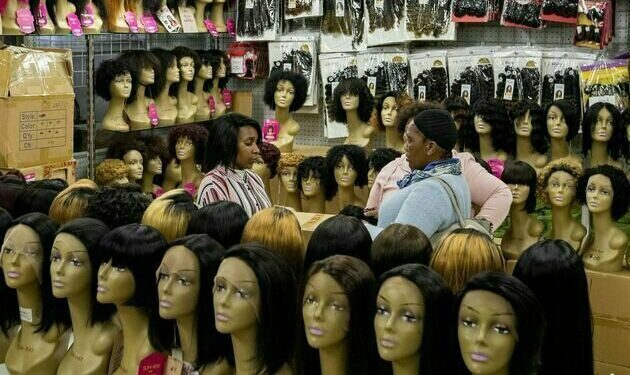The Conversation
23 Jun 2024, 09:14 GMT+10
Well-groomed hair is a symbol of beauty for many black African women. Natural hair requires special care and attention, though, which can be time consuming. Wigs (human or synthetic hair), weave-ons and other artificial hair extensions offer women an alternative to their natural hair.
In Nigeria, these alternatives are very popular with women, both young and old. The synthetic hair value chain is a big business worth millions of dollars and run by both local and foreign industries. Hairdressing salons flourish, providing styling and grooming services for women.
But we’ve found that there are contaminants hiding in synthetic hair. Man-made fibres go through various chemical processes to make them look and feel more like human hair. The raw materials used to make some of the products are toxic. And the hair products are mainly made from plastics which are not biodegradable, which is harmful to the environment.
In our study in Nigeria, we investigated 10 synthetic hair brands commonly worn by women. Some were made in Nigeria, others in China, Ghana and the USA. We found that all of them had different levels of contaminants such as silver, cadmium, chromium, nickel, vanadium and lead, including several pesticides which are hazardous to human health.
Synthetic hair is usually worn close to the scalp. Women who wear it should be aware of the potential harm.
Regulators should ensure that manufacturers of synthetic hair stop using plastic-based synthetic products and use natural plant fibres and protein blends instead. These hair fibres are biodegradable and free from harmful chemicals.
We bought 10 popular synthetic hair brands of various colours (Catherine, Eye Candy, Gold, Calypso, LVH, Dazzler, Mini Bob, Nectar, Diana and X-pression) from the Ariaria International market in Aba, in south-eastern Abia State.
The samples were analysed in a laboratory.
We used the US Standard Methods for the Examination of Water and Wastewater to determine the presence of heavy metals (such as cadmium, zinc, lead, chromium, manganese, iron, mercury, copper and nickel) in the synthetic hair.
We found heavy metals in significant amounts. One of them, lead, is used in stabilising the polyvinyl chloride (PVC) that the synthetic hair is made of. Lead compounds (such as basic lead carbonate, lead stearate and lead phthalate) prevent heat, light or wear and tear from breaking down the PVC, and make it easier to form into shapes.
Lead is dangerous to humans, however. It affects the membranes, DNA, and antioxidant defence systems of cells. Lead also interferes with the normal development of a child’s brain and nervous system.
The metals that are used to stabilise the polymer are not bound to it. They can leach out over time or when exposed to light. So, when women wear synthetic hair, whether as attachments, weave-ons or wigs, on their heads or as fake eyelashes, they risk exposure to lead and other heavy metals. This is the case for all synthetic hair brands made from plastics.
In humans, exposure to heavy metals is associated with various biological risks such as damage to the kidneys, liver, lungs, reproductive system and nervous system. It has also been associated with cancer, skin irritations, asthma and cardiovascular diseases.
We found also that the synthetic hair samples were contaminated with 11 chemical compounds which are pesticides. The levels of these chemicals found in the hair exceeded permissible limits, making them dangerous to health.
Since they were present in significant amounts, we suspect they were used as a form of preservative by the manufacturers.
We also found high levels of nitrate in the hair samples we studied. This has not been reported in previous studies on synthetic hair. Exposure to high levels of nitrate can lead to diseases such as cancer, enlargement of the thyroid gland and methemoglobinemia (a blood disorder).
Exposure to the toxic chemicals that we found in synthetic hair can have serious health consequences. Apart from damage to vital organs, they can cause infertility, birth defects, asthma, bronchitis and cancers. They also lead to attention deficit hyperactivity disorder, endocrine system disruption and respiratory diseases, among others.
People who wear synthetic hair should consider these risks, especially as chemical substances and heavy metals can be harmful even at low levels.
Since Nigeria has large synthetic hair manufacturers in Lagos, the National Agency for Food and Drug Administration and Control should constantly review and evaluate the safety of the chemical ingredients used in making these products.
Synthetic hair manufacturers do have other options. They can use high quality synthetic fibres such as hiperlon instead of plastic fibres. They should use fibres that are free from PVC and toxic materials, and opt for environmentally friendly ones.






